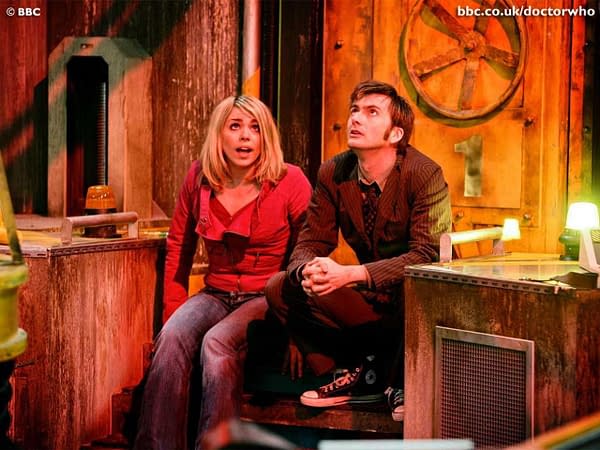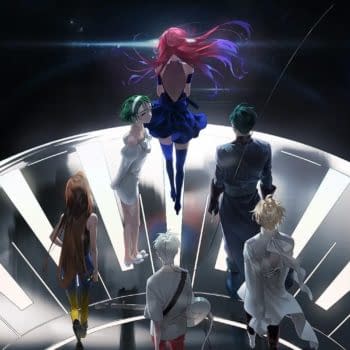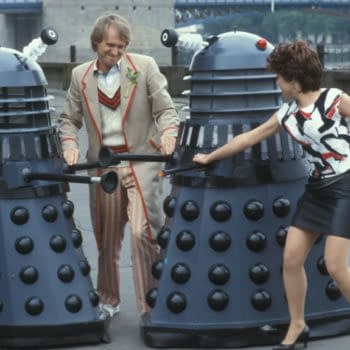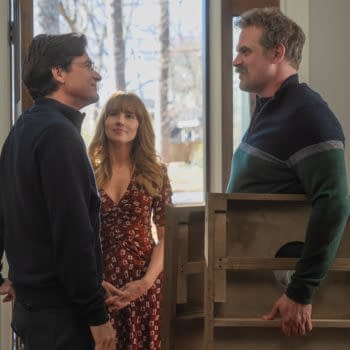Posted in: BBC, Doctor Who, TV | Tagged: bbc, billie piper, bleeding cool, cable, david tennant, doctor who, podcast, russell t davies, science fiction, streaming, tardis, television, tv
Doctor Who: Billie Piper on When People Were Sure Show Would Bomb
David Tennant released an episode of David Tennant Does a Podcast with… this week where h talked to his former Doctor Who co-star and buddy Billie Piper. The show made the two of them huge stars, though Piper had already spent her teenage years as the biggest pop star in Britain during the 1990s. The podcast is worth a listen. Piper talked about her childhood and upbringing and what it was like to be a pop star and forced to grow up so young before the burnout. She and Tennant also talked about what it was like to star in Doctor Who, which re-established Piper as an actress and a TV star and shot the both of them to fame and celebrity. Tennant joined the show in its second new season in 2006, replacing Christopher Eccleston as The Doctor.

Tennant credits Piper with helping him cope with the sudden fame and loss of privacy that came with becoming the star of the biggest TV show in the country. The show's return in 2005 under showrunner Russell T. Davies and producers Julie Gardner and then BBC Head Jane Tranter was a huge success and not only re-established Doctor Who as a TV institution, but also returned Science Fiction and Fantasy to British television as a staple.
Snobs Expected "Doctor Who" to Bomb
Doctor Who's success wasn't considered a sure thing, though. Before its premiere, Piper said she and everyone involved was nervous that it would bomb.
"When we started making it, everyone said it was going to be a failure. You just didn't imagine it being on for longer than three months, imagining that 15 years later it's still probably the biggest job you will have ever done, and you'll still be talking about it and going off and meeting people and celebrating it, that was a big reach," Piper said. "It was a huge gamble, and we were all quite aware of that when we were shooting it, which sort of meant we couldn't enjoy it as much as we did in our second series."
Bringing Doctor Who back to television after it was canceled in 1989 should have been a no-brainer, but Science Fiction and Fantasy had largely fallen by the wayside on British TV during the 1990s. The television landscape in the 90s was taken over by dark, joyless cop shows about hunting serial killers, adaptations of Jane Austen, and the meteoric rise of reality TV shows starting with Big Brother. Television executives treated Science Fiction and Fantasy with contempt, part of the British Establishment's middle-class snobbery towards the genre. This was despite the fact that Buffy the Vampire Slayer and The X Files were massive hits in the UK as well, proving there was a real hunger for Fantasy and Science Fiction amongst audiences.
There were efforts to produce some Science Fiction and Fantasy TV in the 90s, but none of them stuck. They were either botched fantasies like the original TV version of Neil Gaiman's Neverwhere and the failed BBC adaptation of Mervyn Peake's Gormenghast, or mediocre crime shows with a SciFi veneer like Crime Traveler. The only major Science Fiction miniseries Invasion: Earth was staggeringly forgettable. Doctor Who was sorely missed by the public that remembered it, while an entirely new generation of kids grew up without ever seeing it.
We Live in a "Doctor Who" World Now
Doctor Who returning in 2005 opened the floodgates for Science Fiction and Fantasy TV not just in the UK but also had a ripple effect in the US as well. Its spinoffs like Torchwood, The Sarah Jane Adventures, Class, new shows like Orphan Black, the CW DC superhero shows, especially Legends of Tomorrow, Outlander, A Discovery of Witches, various Netflix Science Fiction and Fantasy shows, even Killing Eve are all beneficiaries of Doctor Who's success. The key is the show's active appeal to a female audience that had already been primed by Buffy. It helped cement the notion that Fantasy and Science Fiction appealed to female fans as well, not just male geeks. It gave the genre a female point of view, and that entry point was Piper as Rose Tyler. Buffy opened the door, but she walked through it and lead everyone else with her.














